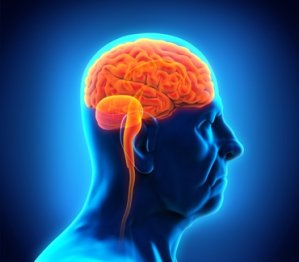B vitamins slows cerebral atrophy and prevent dementia especially when combined with fish oil
 Studies show that large quantities of B vitamins are able to slow mild cognitive impairment, which is an early stage of dementia and Alzheimer's disease. A more recent study suggests, however, that B vitamins are not effective, unless the body is properly supplied with the omega-3 fatty acids that are found in fish oil.
Studies show that large quantities of B vitamins are able to slow mild cognitive impairment, which is an early stage of dementia and Alzheimer's disease. A more recent study suggests, however, that B vitamins are not effective, unless the body is properly supplied with the omega-3 fatty acids that are found in fish oil.
An Oxford research team has studied 266 elderly people with mild cognitive impairment (MCI). MCI occurs when brain functions like memory and speech deteriorate without necessarily meaning that the person is unable to function in daily life. Nonetheless, there is a risk that mild cognitive impairment, if left untreated, may lead to dementia and Alzheimer's disease. According to Dr. Celeste from the team of researchers, large doses of folic acid (formerly known as vitamin B9), vitamin B6, and vitamin B12 may slow or prevent cerebral atrophy and memory loss in people with mild cognitive impairment.
Interestingly, the mentioned nutrients were only effective on those study participants who had elevated blood levels of the amino acid homocysteine. Elevated homocysteine levels have a toxic effect on the body and increases the risk of atherosclerosis and Alzheimer's disease.
It has long been known that folic acid, vitamin B6, and vitamin B12 are all part of enzymatic functions that control blood levels of homocysteine. Nonetheless, the Oxford scientists have now discovered a link between levels of omega-3 and homocysteine, and cerebral atrophy.
A collaboration between B vitamins and omega-3 fatty acids
The researchers wanted to find out if omega-3 fatty acids and B vitamins collaborate in the body in connection with cognitive skills and the prevention of cerebral atrophy. In the beginning of the study, all participants underwent a test of their cognitive skills, and their blood levels of the omega-3 fatty acids, EPA and DHA, were measured. Afterwards, the participants were split in two groups that were given either supplements of B vitamins (folic acid, vitamin B6, and vitamin B12), or placebo (dummy pills) for two years.
After two years had passed, the scientists observed that participants with low omega-3 levels only had a slight effect of the B vitamins, or no effect at all. In contrast, those participants who had the highest levels of omega-3 responded well to the B vitamins in terms of prevention of cerebral atrophy and preservation of cognitive skills.
According to the researchers, supplements of B vitamins are only able to slow cerebral atrophy associated with mild cognitive impairment in those who already have high blood levels of omega-3. In future studies, the researchers will investigate if supplements of B vitamins combined with fish oil can prevent mild cognitive impairment from developing into Alzheimer's disease.
Timely intervention
As dementia and Alzheimer's disease are growing problems with enormous human and economic costs, it is a clear advantage if we can prevent these dreaded diseases. Although more research is needed, available studies clearly suggest that is pays off to ingest sufficient amounts of folic acid, vitamin B6, vitamin B12, and the two omega-3 fatty acids, EPA and DHA, that are found in fish oil.
Cerebral atrophy, dementia, and Alzheimer's diseaseCerebral atrophy is caused by a loss of brain cells and is detectable through CT or MR scans Blood samples, folic acid, and B vitaminsLack of folic acid (B9) is often seen in combination with lack of vitamin B12. Vitamin B12 and absorptionVitamin B12 is mainly found in animal sources. It is generally more difficult for the body to absorb vitamin B12 than other vitamins, and the body's absorption decreases with age. In some cases, for instance when people have pernicious anemia, vitamin B12 should be given as injections. Fish oil and absorptionOily fish such as herring and wild salmon are good sources of the omega-3 fatty acids, EPA and DHA, that are important for the brain and nervous system. |
References:
Oulhaj et al: Omega-3 Fatty Acid Status Enhances The Prevention of Cognitive Decline by B-vitamins in Mild Cognitive Impairment. Journal of Alzheimer's Disease. 2016
Omega-3 levels affect whether B vitamins can slow brain´s decline. University of Oxford. Health and News. 2016
David Smith et al. Homocysteine-Lowering by B-vitamins Slows the Rate of Accelerated Brain Atrophy in Mild Cognitive Impairment: A Randomized Controlled Trial. PLOS ONE 2010
https://www.sundhed.dk/borger/sygdomme-a-aa/hjerne-og-nerver/sygdomme/oevrige-sygdomme/hjernesvind/
Search for more information...
- Created on .








